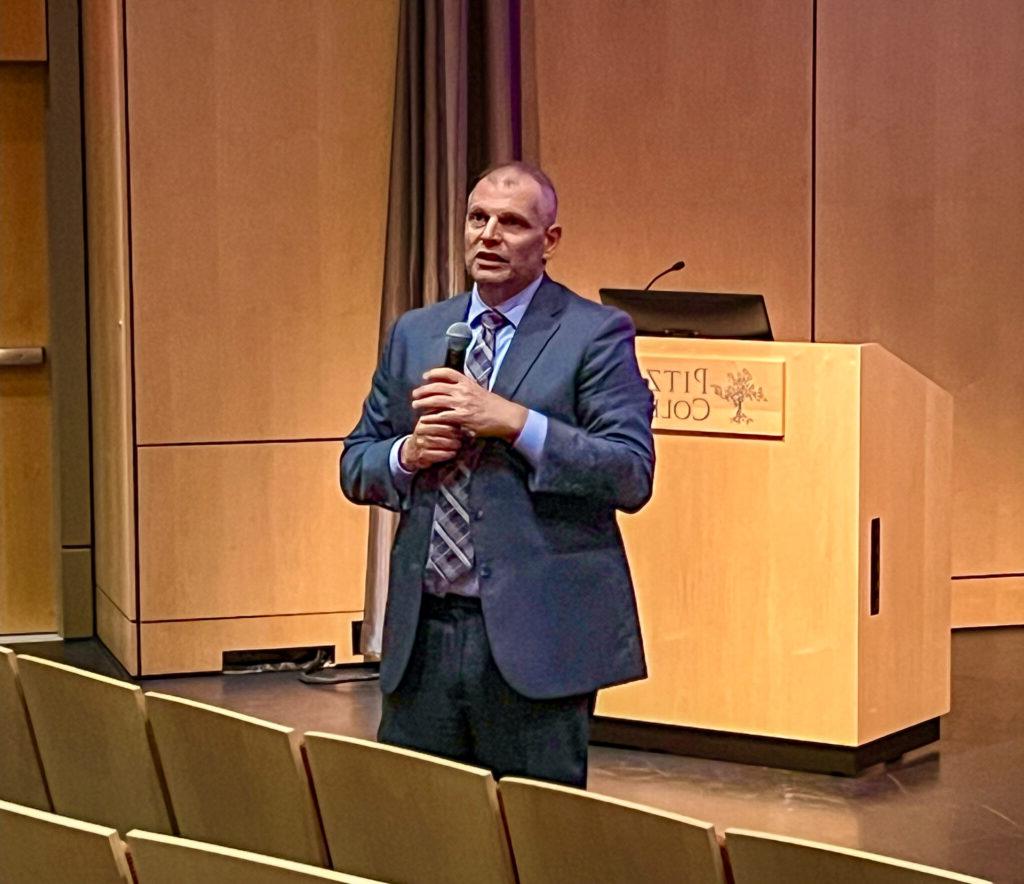Earlier this week Henry C. Theriault looked out on an audience of Claremont students, faculty and staff in Benson Auditorium and shared a grim fact: Even the most unimaginable acts of human cruelty are far more common than most people realize.
“Terrible atrocities have been committed, and yet if you flip from Rwanda to Bosnia or Cambodia, quite often you see many of the same ones,” he said.
 Henry C. Theriault discussed the Armenian genocide as part of the MCSI fall series.
Henry C. Theriault discussed the Armenian genocide as part of the MCSI fall series.
Theriault visited campus to deliver the talk “The Failure to Repair and the Persistence of Genocide” as part of the 2023 fall semester program of events presented by the Ruth and Lee Munroe Center for Social Inquiry (MCSI).
Though he centered on the Armenian genocide of the early 20th century, Theriault also discussed many other places around the world where genocidal violence has destroyed communities and where dangerous genocidal rhetoric continues to rise.
“The systematic destruction of the Ottoman Empire’s Armenian population followed a familiar trajectory,” said Theriault, who serves as associate vice president for academic affairs at Worcester State University and is former coordinator of the university’s Center for the Study of Human Rights. “If you look at other places, Rwanda, for instance, you see a similar trajectory there.”
That trajectory includes forcing the population’s men into slave labor, eliminating influential voices in the community, and forcing the women into sexual slavery as part of a program of assimilation (and cultural erasure).
Each academic year, the MCSI presents a program designed to blend interdisciplinary learning with public inquiry as embodied by two distinguished former professors at the College, the late Robert “Lee” Munroe, a professor of anthropology, and the late Ruth Hagberg Munroe, a professor of psychology.
For 2023 MCSI Director Jesse Lerner, this semester’s program—which is titled “Apologies, Reparations, and Restitution”—examines the ways that nations and institutions can make amends for past injustices and atrocities.
What is the legacy of the perpetrator? Can it restore
its moral image?
“Each of the cases presented by our speakers is unique and involves particular circumstances and considerations,” explained Lerner, who is a professor of media studies, “but there are ways to learn general lessons from these individual examples.”
Lerner said the program has been designed with two goals in mind. Theriault and the other speakers in the first half of the semester discuss how to make up for injustice while speakers in the second half “focus on objects, typically taken as colonial loot, and the issues involved in repatriating them.”
In addition to Theriault, MCSI’s speakers so far have included UC Santa Cruz History Chair Alice Yang on Japanese American incarceration in World War II and UC Berkeley Geography Chair Jovan Scott Lewis on the possibilities for African American reparations and what Black repair should ideally be.
This fall’s program, Lerner said, “poses several important questions for students to consider, such as what is the legacy of the perpetrator? Is there any way for it to restore its moral image? Why are certain historic injustices recognized while others are largely ignored?”
Still ahead on the MCSI program this fall are reparatory justice scholar Kamilah Moore, digital technologies scholar Charles Cronin, Getty Research Institute Director Mary Miller, and Mark Weitzman, who serves as chief operating officer of the World Jewish Restitution Organization.
The fall program will close with London- and Los Angeles-based artist Gala Porras-Kim, whose work will also be the focus of an exhibition in the spring hosted by MCSI in collaboration with Pitzer College Art Galleries.
The spring exhibition will center on work that Porras-Kim did at the Peabody Museum regarding a large collection of objects that archaeologist Edward Herbert Thompson dredged from the Sacred Cenote of the Maya archaeological site of Chichén Itzá in Yucatán. In the first decade of the last century, Thompson used very destructive techniques to remove these objects before smuggling them out of Mexico.